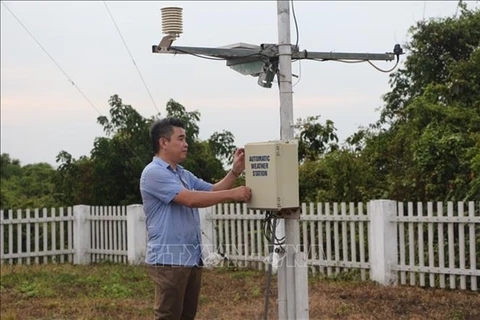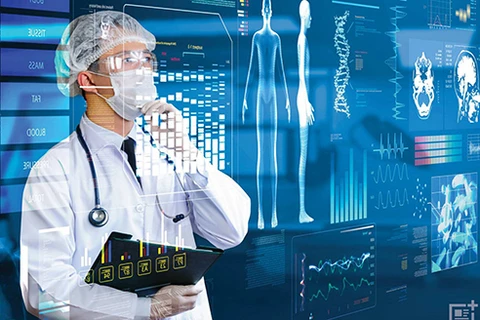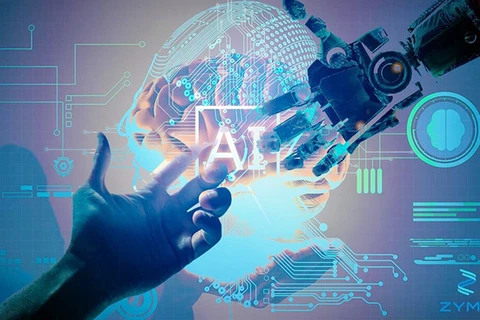Hanoi (VNA) – Artificial intelligence (AI) has an important role to play in the development of modern and sustainable agriculture as it will help with farm automation and optimisation, from weather forecasting, plant and livestock health monitoring to product quality improvement, heard a workshop in Hanoi on March 23.
Ho Xuan Hung, Chairman of the General Council of Agriculture and Rural Development of Vietnam, said AI-based equipment and machinery are becoming popular in the technology era, including in agriculture.
He noted AI can help improve crop productivity; control pests, diseases, and cultivation conditions; and promote the performance of farming-related tasks across food supply chains. Farmers around the globe are applying AI to minimise impacts of chemical use on the environment. Advances in the manufacturing of AI-controlled robots are also helping farmers use less land and manpower while still boosting production.
In Vietnam, AI application to agriculture is still new but grabbing attention from the Government and businesses due to its advantages over traditional farming method, Hung went on.
Echoing the view, Tran Quy, Director of the Vietnam Institute of Digital Economy Development, said the importance of AI to the development of modern agriculture is undeniable, adding that AI can help farmers increase productivity, reduce production costs, improve product quality, ensure food safety, and forecast and reduce climate and disease risks, which also means less fertiliser, pesticide and negative impacts on the environment.
However, he also pointed out a challenge to AI application to agriculture in Vietnam - the high prices for both hardware and software of AI systems. Besides, farmers also needs training to use new technology while relevant parties, including technology producers, the Government, and agriculture organisations, need to cooperate in developing suitable AI applications meeting farmers’ conditions and demand in the market.
Noting some bottlenecks in digital transformation in agriculture, Nguyen Quoc Toan, Director of the Centre for Informatics and Statistics at the Ministry of Agriculture and Rural Development, said the awareness of and regulations on digital transformation in agriculture remain limited. Without regulations paving the way, all non-compulsory applications will not be used widely in reality.
To boost digital transformation in general and AI application to agriculture in particular, he held that it is necessary to raise farmers and businesses’ awareness, issue guidance on digital production processes, develop digital infrastructure, enhance cyber security, and build the sector’s database./.
Ho Xuan Hung, Chairman of the General Council of Agriculture and Rural Development of Vietnam, said AI-based equipment and machinery are becoming popular in the technology era, including in agriculture.
He noted AI can help improve crop productivity; control pests, diseases, and cultivation conditions; and promote the performance of farming-related tasks across food supply chains. Farmers around the globe are applying AI to minimise impacts of chemical use on the environment. Advances in the manufacturing of AI-controlled robots are also helping farmers use less land and manpower while still boosting production.
In Vietnam, AI application to agriculture is still new but grabbing attention from the Government and businesses due to its advantages over traditional farming method, Hung went on.
Echoing the view, Tran Quy, Director of the Vietnam Institute of Digital Economy Development, said the importance of AI to the development of modern agriculture is undeniable, adding that AI can help farmers increase productivity, reduce production costs, improve product quality, ensure food safety, and forecast and reduce climate and disease risks, which also means less fertiliser, pesticide and negative impacts on the environment.
However, he also pointed out a challenge to AI application to agriculture in Vietnam - the high prices for both hardware and software of AI systems. Besides, farmers also needs training to use new technology while relevant parties, including technology producers, the Government, and agriculture organisations, need to cooperate in developing suitable AI applications meeting farmers’ conditions and demand in the market.
Noting some bottlenecks in digital transformation in agriculture, Nguyen Quoc Toan, Director of the Centre for Informatics and Statistics at the Ministry of Agriculture and Rural Development, said the awareness of and regulations on digital transformation in agriculture remain limited. Without regulations paving the way, all non-compulsory applications will not be used widely in reality.
To boost digital transformation in general and AI application to agriculture in particular, he held that it is necessary to raise farmers and businesses’ awareness, issue guidance on digital production processes, develop digital infrastructure, enhance cyber security, and build the sector’s database./.
VNA

























